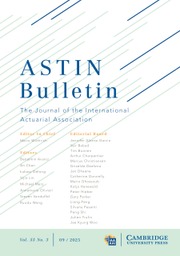Crossref Citations
This article has been cited by the following publications. This list is generated based on data provided by
Crossref.
Lienhard, Markus
1986.
Calculation of Price Equilibria for Utility Functions of the HARA Class.
ASTIN Bulletin,
Vol. 16,
Issue. S1,
p.
S91.
D'Ursel, Laurent
and
Lauwers, Marc
1986.
Pareto optimal chains of reinsurance.
Economics Letters,
Vol. 20,
Issue. 4,
p.
307.
Müller, Heinz H.
1987.
Economic Premium Principles in Insurance and the Capital Asset Pricing Model.
ASTIN Bulletin,
Vol. 17,
Issue. 2,
p.
141.
1990.
Economics of Insurance.
p.
163.
Cummins, J. David
1990.
Asset Pricing Models and Insurance Ratemaking.
ASTIN Bulletin,
Vol. 20,
Issue. 2,
p.
125.
Wyler, Erich
1990.
Pareto Optimal Risk Exchanges and a System of Differential Equations: a Duality Theorem.
ASTIN Bulletin,
Vol. 20,
Issue. 1,
p.
23.
Albrecht, Peter
1991.
Kapitalmarkttheoretische Fundierung der Versicherung?.
Zeitschrift für die gesamte Versicherungswissenschaft,
Vol. 80,
Issue. 3-4,
p.
499.
Aase, Knut K.
1992.
Dynamic Equilibrium and the Structure of Premiums in a Reinsurance Market.
The Geneva Papers on Risk and Insurance Theory,
Vol. 17,
Issue. 2,
p.
93.
Berger, Lawrence A.
and
Cummins, J. David
1992.
Adverse selection and equilibrium in liability insurance markets.
Journal of Risk and Uncertainty,
Vol. 5,
Issue. 3,
p.
273.
Shiu, Elias S. W.
1993.
Financial Management of Life Insurance Companies.
Vol. 17,
Issue. ,
p.
151.
Aase, Knut K.
1993.
Equilibrium in a Reinsurance Syndicate; Existence, Uniqueness and Characterization.
ASTIN Bulletin,
Vol. 23,
Issue. 2,
p.
185.
Waegenaere, Anja De
1994.
Equilibria in a mixed financial-reinsurance market with constrained trading possibilities.
Insurance: Mathematics and Economics,
Vol. 14,
Issue. 3,
p.
205.
Chevallier, Eric
and
Müller, Heinz H.
1994.
Risk Allocation in Capital Markets: Portfolio Insurance, Tactical Asset Allocation and Collar Strategies.
ASTIN Bulletin,
Vol. 24,
Issue. 1,
p.
5.
Gerber, Hans U.
and
Shiu, Elias S.W.
1996.
Actuarial bridges to dynamic hedging and option pricing.
Insurance: Mathematics and Economics,
Vol. 18,
Issue. 3,
p.
183.
Suijs, Jeroen P.M.
De Waegenaere, Anja M.B.
and
Borm, Peter E.M.
1997.
Stochastic Cooperative Games in Insurance and Reinsurance.
SSRN Electronic Journal ,
Hürlimann, Werner
1998.
On Stop-Loss Order and the Distortion Pricing Principle.
ASTIN Bulletin,
Vol. 28,
Issue. 1,
p.
119.
Suijs, Jeroen
De Waegenaere, Anja
and
Borm, Peter
1998.
Stochastic cooperative games in insurance.
Insurance: Mathematics and Economics,
Vol. 22,
Issue. 3,
p.
209.
Gerber, Hans U.
and
Pafum, Gérard
1998.
Utility Functions.
North American Actuarial Journal,
Vol. 2,
Issue. 3,
p.
74.
Bühlmann, Hans
Delbaen, Freddy
Embrechts, Paul
and
Shiryaev, Albert N.
1998.
On Esscher Transforms in Discrete Finance Models.
ASTIN Bulletin,
Vol. 28,
Issue. 2,
p.
171.
Iwaki, Hideki
Kijima, Masaaki
and
Morimoto, Yuji
2001.
An economic premium principle in a multiperiod economy.
Insurance: Mathematics and Economics,
Vol. 28,
Issue. 3,
p.
325.


